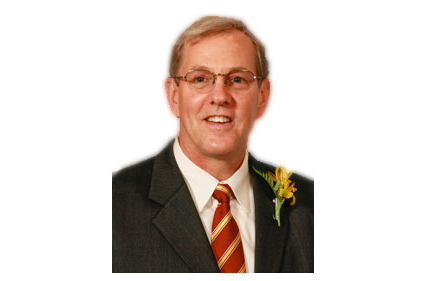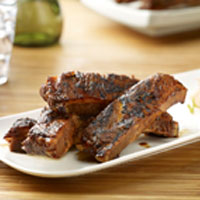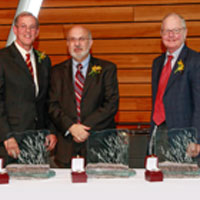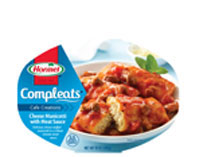|
Meet Phillip L. Minerich Ph.D., Vice President of Research and Development of Hormel Foods
Education: A native of Cleveland, Ohio, Minerich earned a Bachelor of Science degree in food technology at Ohio State University, Columbus, Ohio. He earned his master's and doctorate degrees in food science at the University of Minnesota. |
|
Prepared Foods’ Food for Thought is a feature interview series involving food company R&D professionals, nutritionists, research chefs and other industry executives. In this edition, Food for Thought talks with Phillip L. Minerich, Ph.D., vice president of R&D at Hormel Foods. Minerich oversees product development, packaging, food safety and lab services. PF: If we walked into your office, would we find more memorabilia for the Ohio State Buckeyes or Minnesota Golden Gophers? Phillip Minerich: Both are equally and respectfully represented in my office. PF: Let’s talk about you as a consumer. What Hormel products would we find at home? Minerich: Hormel® refrigerated entrees, Hormel® Compleats®, SPAM® , Hormel® chili, Dinty Moore® beef stew, CHI-CHI’S® salsa, Hormel® party trays, Hormel® Natural Choice®, Skippy® extra crunchy peanut butter, Hormel® Country Crock® Side Dishes *, Hormel® Always Tender® pork and our Hormel® microwave bacon, of course! PF: If you asked one of your corporate chefs for a culinary tip, what would it be?
Minerich: “What are some different ways to season a pork roast?” PF: What’s your favorite new Hormel product? Why? Minerich: I would have to say it’s our new Hormel® Fire Braised™ Meat products for our foodservice segment. All of the products have a very delicious roasted flavor and are extremely tender and juicy. PF: Congratulations for receiving the Siehl Prize for Excellence in Agriculture! We see that honor reflects your career achievements and your involvement with Spammy™. Can you tell us a little bit about how and when you first became involved in that hunger relief-nutrition project? Minerich: Thank you, receiving the Siehl Prize is a great honor. The Spammy™ project was initially conceived by our International Division in 2006, and focused on targeting adult hunger, with a secondary interest to support people in African nations with HIV/AIDS. Our team was involved at the very beginning, but it was a year or so later when our CEO, Jeff Ettinger, redirected the team to create a nutritionally enhanced meat protein-based product to address hunger and malnutrition in Guatemala. PF: What was the most challenging part of the development of Spammy™? How did your team overcome that issue? Minerich: At first, [it was] creating an acceptable taste, texture and form with the right vitamin and mineral enhancements. We achieved success using various process technologies and modifying the product formulation. We also established very close partnerships with the USDA, USAID, Caritas, CeSSIAM, Food for the Poor, and other groups in the U.S. and in Guatemala to help us understand the opportunity. PF: Your diverse responsibilities and assignments have involved so much more than just food science. Along the way, what was one the most challenging new assignments for you? Why? Minerich: I’ve been fortunate to be given many opportunities during my career with Hormel Foods. I think my most challenging, and one of the most rewarding, experiences happened in 1984 when I was named foreman of the ham bone-and-trim operation at our Austin (Minn.) Plant. My boss at the time recognized I needed experience in the people-management side of the business, so he put me in charge of more than 40 people in the processing facility. This valuable opportunity taught me the human aspect of the business. I was not only responsible for managing the products and processes, but the people as well. I quickly learned how managers and leaders had to be good at both the production side and the human side of day-to-day business activities. PF: In what other ways have your responsibilities helped to shape you?
Minerich: I tried to learn something from every person I worked for, or with, during my career. Everyone has their own management style, but it’s important to learn what styles are more effective—and why—and then adapt them to your individual style. My best advice came from my very first supervisor in 1976. He told me to always be firm, fair, honest, and consistent when dealing with people. He told me you won’t necessarily make friends with everyone, but you will earn their trust and respect. PF: Your multi-disciplinary background must have helped break down any functional silos within Hormel Foods. Can you think of an example where cross-functional teamwork helped the company achieve something more quickly or on a more successful scale? Minerich: In the mid-1980s, Hormel Foods began using quality management practices that had become prevalent at the time. I embraced this philosophy and used it as a tool to bridge different departments in the processing facility—by using quality improvement as a common denominator. I also was fortunate to have worked on some very impactful projects such as our conversion of the famous SPAM® can to a two-piece can, with an easy-to-open lid. We also developed the first generation of the Hormel® Compleats® microwave-ready meals packaging, and improved our microwave-ready bacon packaging. These three projects occurred when I was working in the package development group in our R&D division and provided me with the opportunity to work as a member of many cross-functional teams. It was common for representatives from marketing, operations, purchasing, engineering, quality control, accounting and R&D, as well as many of our suppliers, to work together with plant operations to develop, test, validate and commercialize new product and packaging concepts. PF: How would you describe your approach to problem solving? Minerich: All problems are opportunities in disguise. Personally, I see problems as obstacles, not barriers. Obstacles can be overcome, by going over, around, or even through them in some creative way. This is where good teamwork is important. Our teams at Hormel Foods engage many internal and external experts to help resolve issues quickly. Teams also enable important communications across all divisions to make sure all resources are accessed and consensus is obtained when action is required. PF: In your opinion, where do most companies most often face disconnects between R&D and packaging development? What’s your advice? Minerich: I can’t speak for other companies, but I believe one of the strengths in the package development group at Hormel Foods is our close and long relationships with our suppliers. We know our suppliers on a personal level and many of these partnerships span decades, so there is a high level of trust and accountability shared between our company and our suppliers. PF: In your opinion, what’s been the most important new development in microwave packaging during the past few years? What might be the next big development/area of opportunity? Minerich: We continue to grow in this category. I’d say improvements in film and tray technologies with superior clarity, peel-ability, and functional attributes to facilitate new processing technologies have really benefited Hormel Foods. PF: Let’s talk about links between food science and food safety. What’s changed during the past 10 years? Minerich: In the past decade alone, we’ve seen tremendous advancements in food safety and food science. Food safety interventions, whether they are mechanical (retorts, smoke houses, high pressure processing), biological (dry sausage fermentations, natural curing) or ingredient- based, (antimicrobial agents, sanitizers, pH control) are all validated using sound chemical and microbiological procedures. Coupling the science, engineering, chemistry and microbiology to achieve and validate food safety systems has been the cornerstone to the industry’s record of food safety enhancements. PF: No doubt, you’ve seen more prepared food companies embrace high pressure processing (HPP) as a food safety measure. How do you see HPP evolving during the next five to 10 years?
Minerich: HPP is a unique technology that has finally come of age as a significant food safety intervention. It’s the most effective technology for reducing food safety risks for sliced meats, but it’s also very effective as a food processing technology for items such as shelling lobsters, crabs, clams, mussels and oysters, for inactivating enzymes in fruit juices, vegetables and raw meats, and for denaturing proteins to facilitate the removal of hair from pork and beef hides. As a food safety intervention, we’ve seen HPP adapted by more and more processors, especially as consumers are looking for products with clean labels. PF: You’re an advisor to the University of Minnesota’s Food Science & Nutrition department. Meanwhile, we’ve seen more companies create senior positions for nutrition or health and wellness. Do you see these types of professionals playing a bigger role in new product development? Minerich: Many people are concerned about their health and wellness, so we are seeing more interest in natural, organic or nutritionally enhanced products by many processors. Nutritional scientists are helping the product development scientists, chefs and culinary artists think about their products with this added dimension. PF: We see Hormel Foods is a sponsor to the “Culinary Enrichment and Innovation Program” and reach out to the Culinary Institute of America. Can you remember when Hormel Foods started hiring corporate research chefs? What have you learned about working with these professionals? Minerich: Hormel Foods has employed chefs for many years before my career started, but I believe our first “official” chef –hired specifically to work in the R&D division—started in 1986. Many times, chefs approach food in a different manner than scientists do. Culinary artists tend to be a good blend of these two disciplines. Supporting this middle ground has helped Hormel Foods bridge the communication gaps between scientists and chefs with someone who speaks both languages. PF: Hormel has grown well beyond its traditional meat portfolio. Considering acquisitions, etc., what have been one or two entirely new product lines that have been fun for you to learn? Why? Minerich: For the past few years, we have expanded our non-meat options in the Mexican food category with our MegaMex joint venture, which acquired Fresherized Foods, the makers of Wholly Guacamole®, in 2011. Our most recent acquisition of the Skippy® brand has been very exciting because it further expands our non-meat protein portfolio. We have a lot to learn, but we also see tremendous opportunity with this acquisition. PF: We see that Hormel Foods has a separate group for “Corporate Innovation and New Product Development.” How does this complement your activities? Minerich: Innovation is critical to the success of our organization. This team perfectly complements our efforts at R&D to successfully innovate new products as well as the long-term growth strategies of the company. PF: If you visited a university food science program, what advice would you share with students? Minerich: First, learn the science skills to the best of your ability. This includes understanding what the scientific principles are and why they work the way they do. Second, get involved in as many in-class and out-of-class activities as possible. If you plan to work for industry, you need to develop your social, teamwork and personal skills. No one in industry works in silos anymore. Finally, meet and get to know as many professors in your department and related departments as possible during your short stay at college. Attend department, college and alumni functions, and mingle with the staff more than the students. Then build on those relationships and financially support their work or department scholarships with the income you’re receiving from the job their education helped you achieve. They are all experts in their fields, and there will be a time during your career when you will seek their advice. *Country Crock is a registered trademark of the Unilever Group of Companies and used under license. All rights reserved. © Unilever Group. All rights reserved. |




